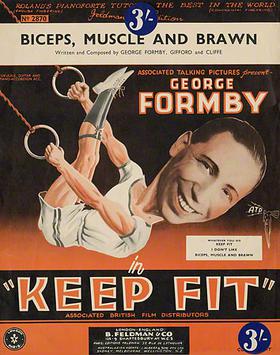Top Qs
Timeline
Chat
Perspective
Keep Fit
1937 British film From Wikipedia, the free encyclopedia
Remove ads
Keep Fit is a 1937 British comedy film directed by Anthony Kimmins and starring George Formby, Kay Walsh and Guy Middleton.[1] It was written by Kimmins and Austin Melford.
Remove ads
Synopsis
George Formby again plays his working class underdog, gormless, gullible, indefatigable and triumphant hero. A weakling, Formby's character overcomes obstacles to beat a corrupt rival in the boxing ring. He plays a scrawny barber's assistant who, in response to the keep fit fad sweeping through Britain at the time, dreams of a better physique, and sings of it in the catchy "Biceps, Muscle and Brawn". He falls in love with a beautiful manicurist, and competes for her affections with a muscle bound thug. The manicurist is more attracted to the brute until the barber can prove that he is a crook, and defeat him in the boxing ring.[2]
Remove ads
Cast
- George Formby as George Green
- Kay Walsh as Joan Allen
- Guy Middleton as Hector Kent
- George Benson as Ernie Gill
- Gus McNaughton as "Echo" publicity manager
- Evelyn Roberts as Mr Barker
- Aubrey Mallalieu as magistrate
- Edmund Breon as Sir Augustus Marks
- Hal Gordon as reporter
- Hal Walters as racing tough
- C. Denier Warren as editor
- Edgar Driver as boat hire owner
- Leo Franklyn as racing tough
- Robert Nainby as judge at the gym
- Julian Vedey as hairdressing dept head
- Jack Vyvian as boat hire man
- D.J. Williams as editor of The Gazette
Remove ads
Critical reception
Summarize
Perspective
Box office
Kinematograph Weekly reported the film as a "winner" at the British box office in February 1938.[3]
Critical
The Monthly Film Bulletin wrote: "The film is boisterous, unconventional and light-hearted, and is played at a smart pace from start to finish. There is the added spice of laconic dialogue and some original situations. George Formby is excellent in the lead; George Benson, playing the ingenuous Ernie Gill, the helpful friend, has a distinctive personality and the teamwork is unusually good. Good entertainment in the Chaplin tradition."[4]
Kine Weekly wrote: "Some of the gags, although presneted on a most ambitious scale, lack spontaneity, and some are obvious, but all recognise the value of simplicity, and it is the sly cultivation of the homely touch, as much as the star's goofy versatility and personality, that contributes confidently to the film's happy augury. The clean, exhilarating fun is wisely aimed at the masses, and with the star's pull to give it direction, it shculd score a bull at the box office. It is George Formby's best."[5]
Leslie Halliwell wrote "Good star vehicle with snappy songs and fast comedy scenes."[6]
In The Radio Times Guide to Films Dick Fiddy gave the film 3/5 stars, writing: "It's hard now to imagine that a toothy-grinned, ukelele-strumming comic with a broad Lancashire accent could be a superstar but George Formby certainly was. A huge box-office draw in Britain during the 1930s and 1940s, Formby's saucy wit and frantic comic style proved a great tonic to wartime audiences. This movie finds the star in fine form, belting out songs and throwing himself into comedy routines, as a weedy barber forced to compete with a more athletic rival. Add a dash of romance and the unmasking of a thief and you've got all the ingredients for a first-rate Formby film."[7]
Sky Movies wrote that Formby "was at his British top box-office peak when this comedy was made. ... It's a bouncy, confidently made comedy that's fun throughout and pretty hilarious in its boxing-ring conclusion".[8]
Remove ads
See also
Further reading
- Perry, George C. (1994). Forever Ealing: A Celebration of the Great British Film Studio (Revised ed.). London: Pavilion Books. OCLC 803151626.
- Wood, Linda (1986). British Films, 1927-1939 (PDF). London: Library Services, British Film Institute. ISBN 978-0-85170-189-9. Archived from the original (PDF) on 14 October 2024. Retrieved 13 April 2021.
- Low, Rachel, ed. (1985). The History of British Film 1929-1939 (Volume 7): Film Making in 1930's Britain. London: Allen & Unwin. ISBN 978-0-04-791042-5.
Remove ads
References
External links
Wikiwand - on
Seamless Wikipedia browsing. On steroids.
Remove ads

